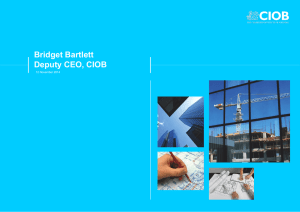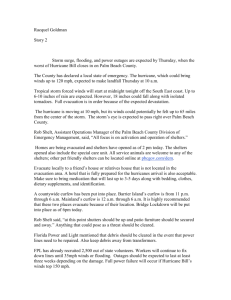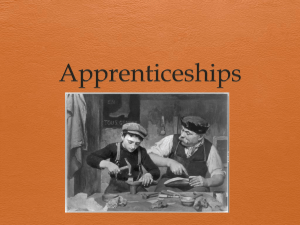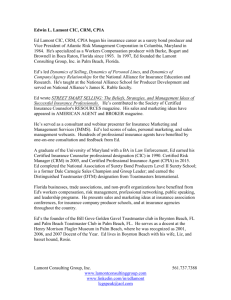2015-2016 - Palm Beach State College
advertisement
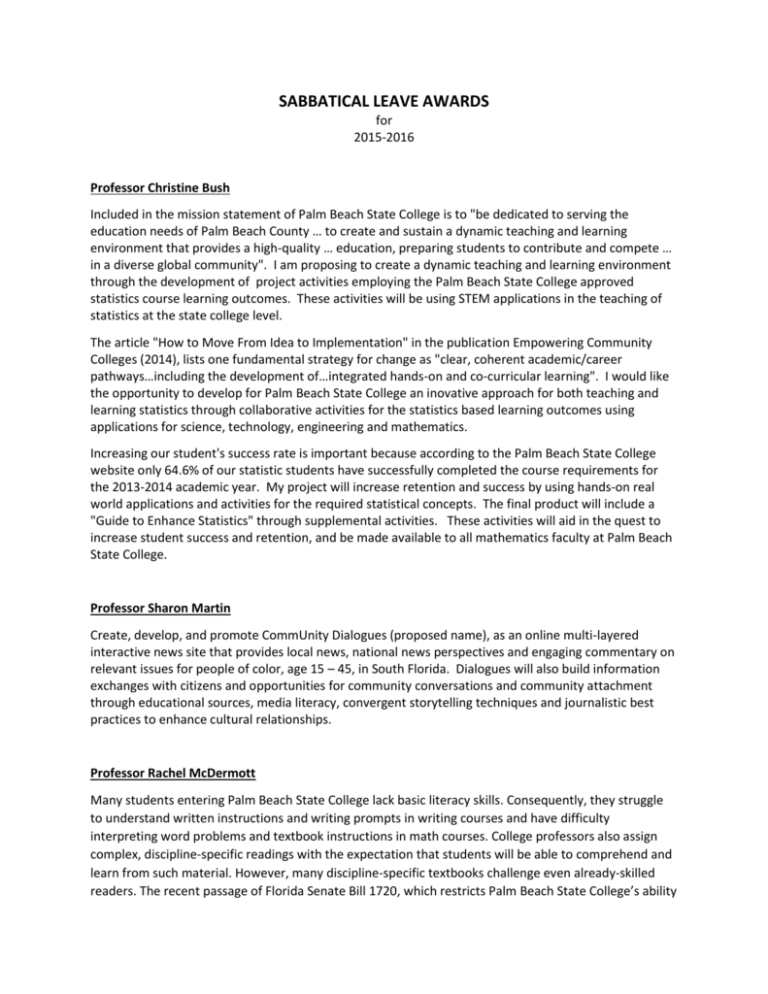
SABBATICAL LEAVE AWARDS for 2015-2016 Professor Christine Bush Included in the mission statement of Palm Beach State College is to "be dedicated to serving the education needs of Palm Beach County … to create and sustain a dynamic teaching and learning environment that provides a high-quality … education, preparing students to contribute and compete … in a diverse global community". I am proposing to create a dynamic teaching and learning environment through the development of project activities employing the Palm Beach State College approved statistics course learning outcomes. These activities will be using STEM applications in the teaching of statistics at the state college level. The article "How to Move From Idea to Implementation" in the publication Empowering Community Colleges (2014), lists one fundamental strategy for change as "clear, coherent academic/career pathways…including the development of…integrated hands-on and co-curricular learning". I would like the opportunity to develop for Palm Beach State College an inovative approach for both teaching and learning statistics through collaborative activities for the statistics based learning outcomes using applications for science, technology, engineering and mathematics. Increasing our student's success rate is important because according to the Palm Beach State College website only 64.6% of our statistic students have successfully completed the course requirements for the 2013-2014 academic year. My project will increase retention and success by using hands-on real world applications and activities for the required statistical concepts. The final product will include a "Guide to Enhance Statistics" through supplemental activities. These activities will aid in the quest to increase student success and retention, and be made available to all mathematics faculty at Palm Beach State College. Professor Sharon Martin Create, develop, and promote CommUnity Dialogues (proposed name), as an online multi-layered interactive news site that provides local news, national news perspectives and engaging commentary on relevant issues for people of color, age 15 – 45, in South Florida. Dialogues will also build information exchanges with citizens and opportunities for community conversations and community attachment through educational sources, media literacy, convergent storytelling techniques and journalistic best practices to enhance cultural relationships. Professor Rachel McDermott Many students entering Palm Beach State College lack basic literacy skills. Consequently, they struggle to understand written instructions and writing prompts in writing courses and have difficulty interpreting word problems and textbook instructions in math courses. College professors also assign complex, discipline-specific readings with the expectation that students will be able to comprehend and learn from such material. However, many discipline-specific textbooks challenge even already-skilled readers. The recent passage of Florida Senate Bill 1720, which restricts Palm Beach State College’s ability to test and place students in developmental courses, has compounded the just-described academic literacy challenges by reducing the number of students who take developmental reading courses. When students struggle with these literacy challenges, professors feel frustrated and often helpless. These feelings foster the common beliefs that (a) students come to college with limited reading skills that cannot be honed, and (b) reading skills are best taught only in standalone, non-discipline-specific modules. Academic literacy programs, specifically Reading Apprenticeship programs, falsify these common beliefs. My sabbatical project is to improve academic literacy in two of Palm Beach State College’s gateway courses—College Composition I (ENC1101) and Intermediate Algebra (MAT1033)—through the creation of pilot Reading Apprenticeship programs for both courses. Retention is a particular concern in these two courses because many entering students are now exempt from taking developmental reading, writing, and math courses. A Reading Apprenticeship problem can help address these retention concerns by helping students to develop discipline-specific reading strategies. The core of a Reading Apprenticeship program is to have teachers and students self-consciously reflect on the contribution reading makes to achievement of the learning outcomes in courses across disciplines. Such a program trains professors (‘masters’)—who are experts in discipline-specific reading—to transfer this expertise to their students (‘apprentices’). This training helps professors to incorporate specific strategies, assignments, discussions, and reading groups into their courses, which are designed to aid students in their development of discipline-specific literacy skills. Rigorous, peer-reviewed research has shown that such Reading Apprenticeship programs are a highly effective means of improving students’ skills and, consequently, student retention and completion rates. Moreover, these programs do not only benefit at-risk students; there is also evidence that they benefit already-skilled readers by improving higherlevel academic literacy (Greenleaf et al.). There is a strong relationship between reading achievement and student retention. A Reading Apprenticeship program for ENC1101 and MAT1033 offers the possibility of improving achievement and retention levels without abandoning our rigorous academic standards. The sabbatical will have two stages: the research stage and the pilot stage. The research stage of the sabbatical will be spent examining and analyzing current Reading Apprenticeship programs in place at College of San Mateo, University of Chicago, and Pasadena City College. The goal of the research portion of my sabbatical is to collate information on the structure and implementation of Reading Apprenticeship in composition and math courses, to learn from the lessons of previous implementations of these programs, and to ask how these programs can best be implemented to meet the unique needs of Palm Beach State College students. Prior to the sabbatical, I will also complete a Reading Apprenticeship 101 course at California State University/West Bay. The course will instruct me in the basics of incorporating Reading Apprenticeship into courses. The research stage will be the foundation for the pilot stage. During the pilot stage of the sabbatical, I will create Reading Apprenticeship pilots for Composition I and Intermediate Algebra. Further details regarding the research and pilot stages of the sabbatical project can be found in Sections 2, 3, 4, and 5 of this proposal.
